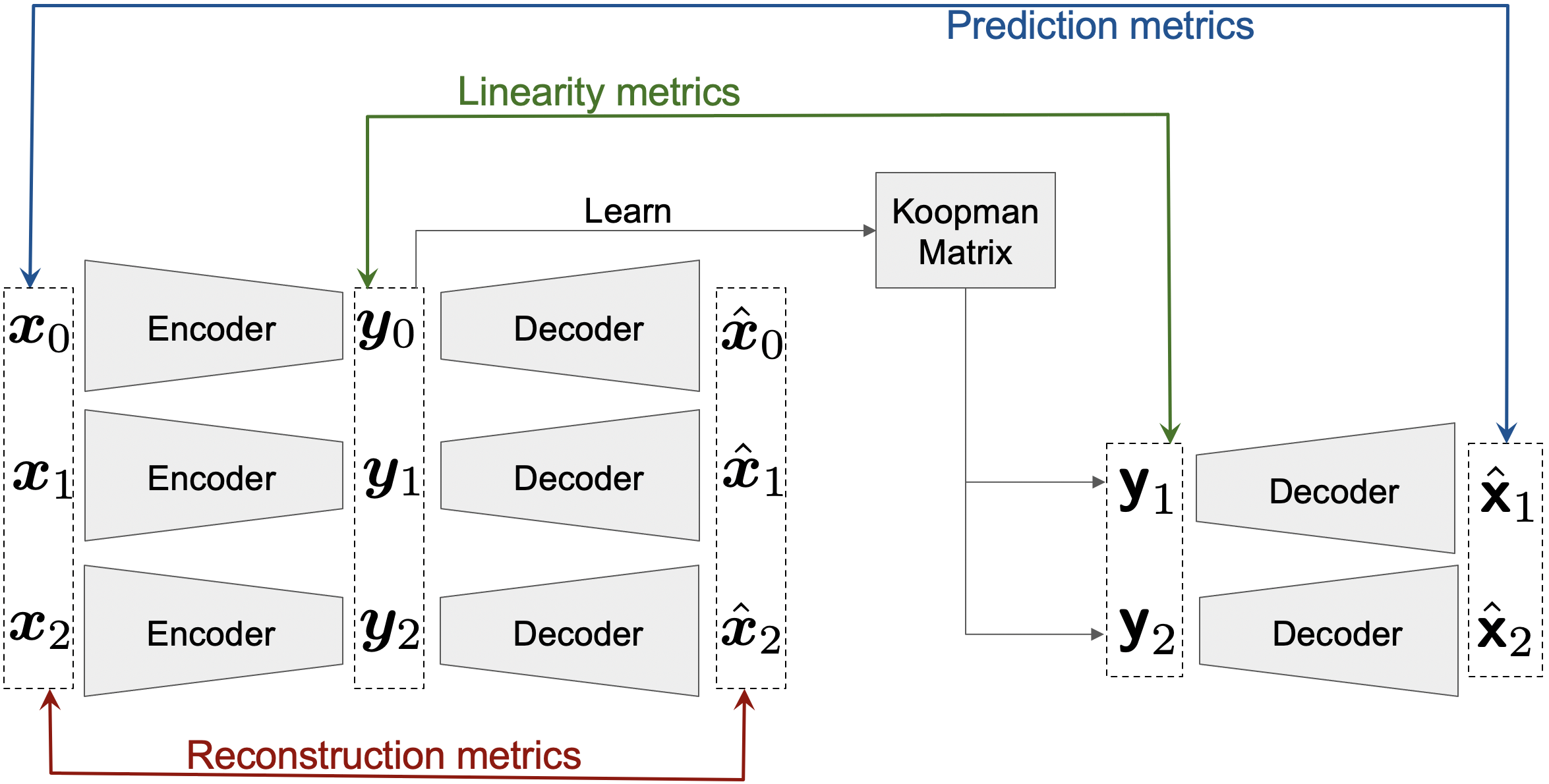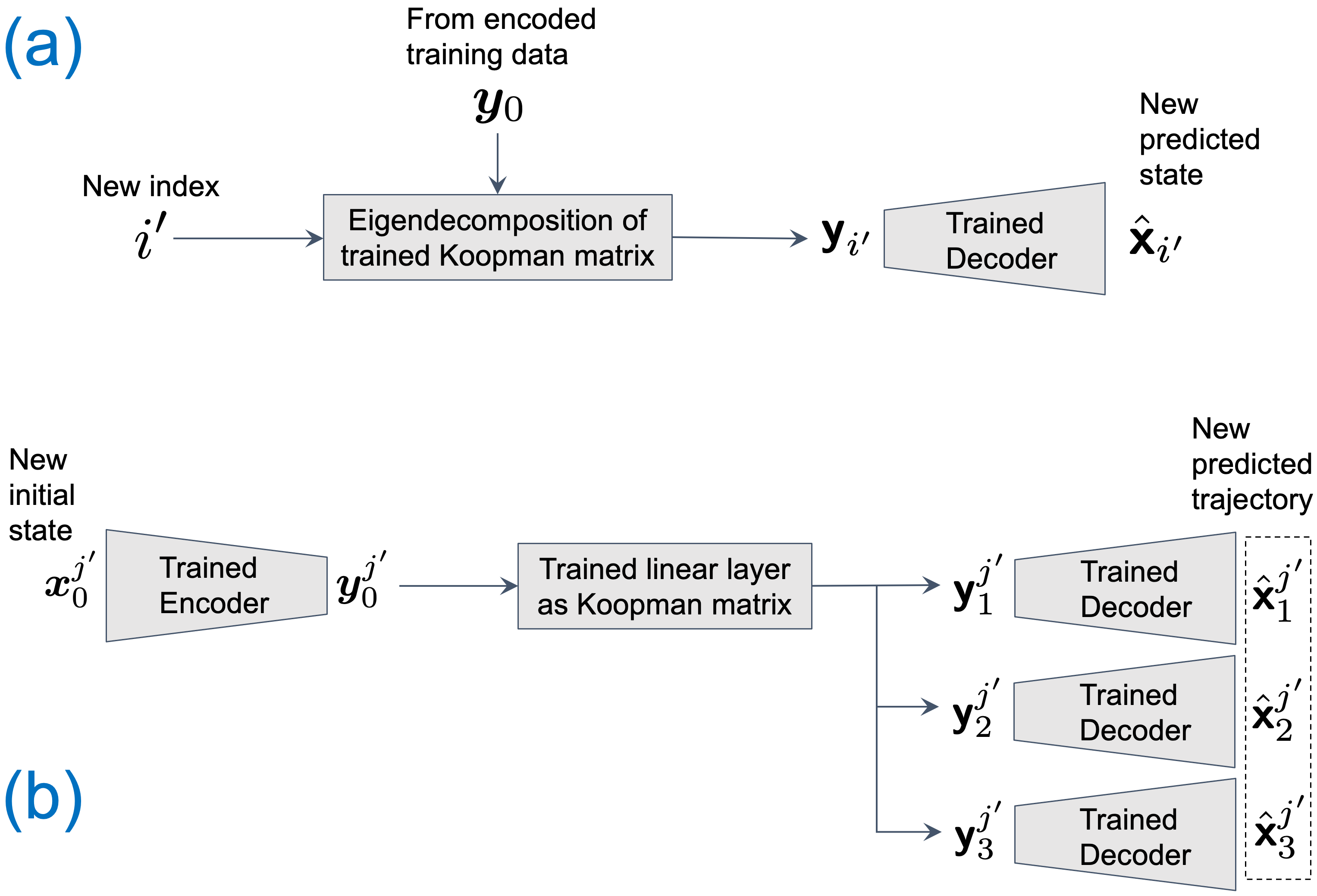A Python package for Koopman theory using deep learning.
Project description
A Python package for Koopman theory using deep learning.
Overview
Koopman theory is a mathematical technique to achieve data-driven approximations of nonlinear dynamical systems by encoding them into a linear space. dlkoopman uses deep learning to learn such an encoding, while simultaneously learning the linear dynamics.
Key features
- State prediction (
StatePred) - Train on individual states (snapshots) of a system, then predict unknown states.- E.g: What is the pressure vector on this aircraft for $23.5^{\circ}$ angle of attack?
- Trajectory prediction (
TrajPred) - Train on generated trajectories of a system, then predict unknown trajectories for new initial states.- E.g: What is the behavior of this pendulum if I start from the point $[1,-1]$?
- General and reusable - supports data from any dynamical system.
- Novel error function Average Normalized Absolute Error (ANAE) for visualizing performance.
- Extensive options and a ready-to-use hyperparameter search module to improve performance.
- Built using Pytorch, supports both CPU and GPU platforms.
Why dlkoopman?
We bridge the gap between a) software packages that restrict the learning of a good linearizable encoding (e.g. pykoopman), and b) efforts that learn encodings for specific applications instead of being a general tool (e.g. DeepKoopman).
Installation
With pip (for regular users)
pip install dlkoopman
From source (for development)
git clone https://github.com/GaloisInc/dlkoopman.git
cd dlkoopman
pip install .
Tutorials and examples
Available in the examples folder.
Documentation and API Reference
Available at https://galoisinc.github.io/dlkoopman/.
Description
Koopman theory
Assume a dynamical system $x_{i+1} = F(x_i)$, where $x$ is the (genrally multi-dimensional) state of the system at index $i$, and $F$ is the (generally nonlinear) evolution rule describing the dynamics of the system. Koopman theory attempts to encode $x$ into a different space $y = g(x)$ where the dynamics are linear, i.e. $y_{i+1} = Ky_i$, where $K$ is the Koopman matrix. This is incredibly powerful since the state $y_i$ at any index $i$ can be predicted from the initial state $y_0$ as $y_i = K^iy_0$. This is then decoded back into the original space as $x = g^{-1}(y)$.
For a thorough mathematical treatment, see this technical report.
dlkoopman training

This is a small example with three input states $\left[x_0, x_1, x_2\right]$. These are passed through an encoder neural network to get encoded states $\left[y_0, y_1, y_2\right]$. These are passed through a decoder neural network to get $\left[\hat{x}_0, \hat{x}_1, \hat{x}_2\right]$, and also used to learn $K$. This is used to derive predicted encoded states $\left[\mathsf{y}_1, \mathsf{y}_2\right]$, which are then passed through the same decoder to get predicted approximations $\left[\hat{\mathsf{x}}_1, \hat{\mathsf{x}}_2\right]$ to the original input states.
Errors mimimized during training:
- Train the autoencoder - Reconstruction
reconbetween $x$ and $\hat{x}$. - Train the Koopman matrix - Linearity
linbetween $y$ and $\mathsf{y}$. - Combine the above - Prediction
predbetween $x$ and $\hat{\mathsf{x}}$.
dlkoopman prediction

Prediction happens after training.
(a) State prediction - Compute predicted states for new indexes such as $i'$. This uses the eigendecomposition of $K$, so $i'$ can be any real number - positive (forward extapolation), negative (backward extrapolation), or fractional (interpolation).
(b) Trajectory prediction - Generate predicted trajectories $j'$ for new starting states such as $x^{j'}_0$. This uses a linear neural net layer to evolve the initial state.
Known issues
Some common issues and ways to overcome them are described in the known issues.
How to cite
Please cite the accompanying paper:
@article{Dey2022_dlkoopman,
author = {Sourya Dey and Eric Davis},
title = {DLKoopman: A deep learning software package for Koopman theory},
year = {2022},
note = {Submitted to 5th Annual Learning for Dynamics & Control (L4DC) Conference}
}
References
- B. O. Koopman - Hamiltonian systems and transformation in Hilbert space
- J. Nathan Kutz, Steven L. Brunton, Bingni Brunton, Joshua L. Proctor - Dynamic Mode Decomposition
- Bethany Lusch, J. Nathan Kutz & Steven L. Brunton - Deep learning for universal linear embeddings of nonlinear dynamics
Distribution Statement
This material is based upon work supported by the United States Air Force and DARPA under Contract No. FA8750-20-C-0534. Any opinions, findings and conclusions or recommendations expressed in this material are those of the author(s) and do not necessarily reflect the views of the United States Air Force and DARPA. Distribution Statement A, "Approved for Public Release, Distribution Unlimited."
Project details
Download files
Download the file for your platform. If you're not sure which to choose, learn more about installing packages.
Source Distribution
Built Distribution
File details
Details for the file dlkoopman-1.0.1.tar.gz.
File metadata
- Download URL: dlkoopman-1.0.1.tar.gz
- Upload date:
- Size: 27.1 kB
- Tags: Source
- Uploaded using Trusted Publishing? No
- Uploaded via: poetry/1.2.2 CPython/3.9.12 Darwin/19.6.0
File hashes
| Algorithm | Hash digest | |
|---|---|---|
| SHA256 | a73c3269f208d67dab4aea5010d2a8d9146d926d84cbf087b3a029f6414b0b63 |
|
| MD5 | e2c67a2845a9a65cfcb96076bc6abbff |
|
| BLAKE2b-256 | d7afa7c86c1a2036e72f3884d6dc58eb8c57494a1a17f489cb1a0940fcf9b7bb |
Provenance
File details
Details for the file dlkoopman-1.0.1-py3-none-any.whl.
File metadata
- Download URL: dlkoopman-1.0.1-py3-none-any.whl
- Upload date:
- Size: 31.2 kB
- Tags: Python 3
- Uploaded using Trusted Publishing? No
- Uploaded via: poetry/1.2.2 CPython/3.9.12 Darwin/19.6.0
File hashes
| Algorithm | Hash digest | |
|---|---|---|
| SHA256 | 82ca9a8ce5f7ce824a95c3b7c41147137b1d9d626d2daad47161e766791902dd |
|
| MD5 | 5a85454571c1ac97109315fc8da77128 |
|
| BLAKE2b-256 | 91862ac556d7f27977fd9bf38c0bd34b177978589fd10522ffc04159e2a41072 |











